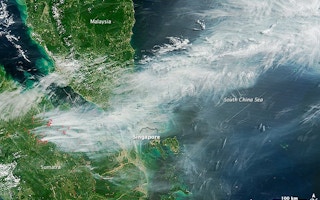More than 50 plantation companies are being punished or investigated by the Indonesian for fires linked to the choking haze that polluted skies across Southeast Asia this fall.
A week ago Monday, Forestry Minister Siti Nurbaya announced that 23 companies — mostly plantation firms that produce wood fiber for the pulp and paper industry — have been punished to date. Three companies lost their operating licenses, forcing them to shut down, while 16 had their licenses suspended and four are on probation. Another 33 companies are being investigated.
The Indonesian government only released the initials of the companies, but The Straits Times noted three Asia Pulp & Paper (APP) suppliers — Mega Alam Sentosa, Bumi Mekar Hijau (BMH) and Sebangun Bumi Andalas Wood Industry (SWI) — as being on the list. BMH and SWI operate in South Sumatra, where the worst of the burning occurred. APP said it suspended contracts with the two South Sumatra companies last month.
The Indonesian government earlier revoked the licenses of PT Tempirai Palm Resources, PT Waringin Agro Jaya and PT Langgam Inti Hibrindo for fires.
The sanctions may not be the end of the legal woes for the companies. The Singaporean government has said it plans to take action against firms linked to haze-causing fires, which triggered widespread hospitalizations and may have caused upward of $16 billion in economic losses, according to an estimate from the World Bank.
Satellite data indicate that many of the fires occurred on lands that have been deforested, degraded or drained to establish oil palm or wood fiber plantations in Sumatra and Indonesian Borneo.
The fires, which burned for months longer than normal due to dry conditions brought on by el Nino, were at one point releasing more carbon into the atmosphere on a daily basis than the entire US economy. More than 2 million hectares of land are thought to have been charred.
This story was published with permission from Mongabay.com.








